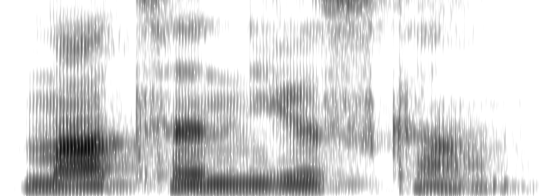
Exams and paper deadlines
Registration for all of my regular and resit exams happens through eCampus and usually opens (closes) about 4 (2) weeks before the exams themselves. Make sure registration actually worked and the relevant exam is listed in your eCampus profile!
Students need to register separately for resit exams, irrespective of whether they took part in regular exams. Details such as concrete time windows for registration are communicated in class and through Moodle.

Resources for students
- Information on final orals
- Guidelines for empirical projects
(term papers & final theses) - Praat e-learning module (phonetics)
- AntConc e-learning module (morphosyntax)
- R e-learning module (statistics)
- DARLA online interface
(semi-automated audio-transcription alignment)

Scholarships
- "Werkzeugkoffer Stipendienkultur"
(RUB Moodle course; general overview of scholarships and application process) - Direct application at Studienstiftung des deutschen Volkes
(first- and second-term students only)

Classes
See below for abbreviated summaries of my classes. In the official course catalogue you will find full descriptions for the classes of the ongoing semester - including modes of assessment and the amount of credit points attached to each course.
How is society reflected in language use? How does language use contribute to establishing, maintaining, and modifying the shape of society? What is the role of extra-linguistic factors in language variation and change?
Sociolinguists address these and a number of related issues by investigating the impact of social factors such as style, class, age, gender, ethnicity, religion, or level of education. Language attitudes, questions of identity, and the structure of social networks are also among the range of phenomena that this line of research is interested in.
This class offers students an overview of the most important concepts, research methods, and the evolution of the field – from the first, classical studies to very recent work. By the end of the term, participants should be equipped with the necessary tools to start their own sociolinguistic research projects.
In this class, students will receive an introduction to the sound system of English. They will learn to perceive, distinguish, and describe the phonemes of English and their most common allophones. Stress, intonation, connected speech processes, and syllable structure are also of central interest. In addition, students will practise phonemic transcription of Received Pronunciation and General American.
As in life, the only constant in language is change. This becomes obvious when young adults realise they use phrases that didn’t even exist when their parents were their age, when the author of a two hundred year-old book uses a word in a seemingly strange way, or when something that is supposed to basically be the same language is virtually unintelligible (looking at you, Old English).
In this class, we will consider examples of change from all levels of linguistic structure: sounds, word forms, meaning, and syntactic constructions. We will see that many of these changes interact and are not as random as they might first appear. Instead, they actually follow common patterns and trends of development that are found time and again across many different languages. We will also discuss sources and triggers of language change and see that they come from both inside and outside the language they happen in. By the end, students will be able to plan and execute their own small-scale research project in the discipline.
Psycholinguists work at the interface of linguistics and psychology. In one way or another, they are interested in how language is represented and processed in the mind. Among other things, research looks at how words are stored in the mental lexicon, how speakers plan utterances, how slips of the tongue happen, whether language perception and production are interconnected, how people recognise words when reading, or which cognitive processes are relevant in first and second language acquisition. This class will give you the opportunity to discuss central ideas and findings of the discipline as well as learn about the experimental methods used to test psycholinguistic hypotheses. By the end you will be able to design and execute your own small-scale research project.
Starting from the question of what standard(isation) actually means for linguists, this class will have a detailed look at what has come to be known as standard British English. We will discuss the traditional account of how and why a common language variety emerged in the 14th and 15th century, and see in what ways this account has been challenged in more recent years. Standardisation processes will be illustrated with examples from different levels of linguistic structure (lexicon, morphology, syntax), but the main focus is going to be on the standard accent of England. Students will learn about its origins in and development since the 19th century, and the study of modern RP will show them that a lot of what English Sounds and Sound Systems taught them about standard British pronunciation is considerably outdated.
Empirically-minded linguists have been using digital collections of texts (corpora) as research data for decades. The ever-increasing size of these collections made ‘traditional’ methods such as close reading no longer practical and gave rise to corpus linguistics, the scientific analysis of hundreds of millions of words of text with the help of computer software. In this class, we will discuss central concepts and address theoretical issues of this powerful and flexible research paradigm that can be applied from term papers to doctoral theses.
Primarily, however, we will be doing hands-on exercises with freely available data and software and consider case studies on the levels of the lexicon, morphology, and grammar. Students will need to have access to their own laptop in class in order to meaningfully partake in these practical exercises. By the end of term, participants should be able to plan and execute their own small-scale research projects on a wide range of topics.
Historical linguistics is often primarily interested in structural features, such as ways in which the syntactic rules of Old English differ from those of present-day English, or how the phoneme inventory changed from Middle English to Early Modern English. This class moves the focus towards parole, meaning we will look at aspects of historical language use. In addition to describing concrete examples of past patterns of usage (discourse markers, speech acts, genre conventions...) we will discuss methodology in the sub-discipline, and see how communicative practices can lead (and have led) to long-term change in the language system.
Morphology is the branch of linguistics that investigates the structure of words and their components, the morphemes of a language. We will first have a more detailed look at word formation processes, inflection, and concepts such as productivity and blocking.
Building on that, we will analyse more complex cases where processes interact, or where they happen at the interface of morphology with syntax or phonology. Some discussion of morphological theory will round off the seminar.
While the main focus will be on present-day English, we will also ocasionally take a historic and/or typological perspective to include data from earlier forms of English and languages with (radically) different morphological systems.
It is an obvious fact that the internet abounds with linguistically interesting data in a wide range of shapes and forms, from static websites to forums, blogs, social media, and audio recordings. Something that is often a lot less obvious is how we can actually access and analyse these data. This will be the focus of this class.
We will first address some existing online databases and how to use them, before moving on to how we can create our own tailored data collections from static and dynamic sources. Since the resulting corpora can often be quite large, it is essential that we also familiarise ourselves with computerised and semi-automatic ways of analysing our data.
A significant part of the class will be dedicated to very practical hands-on exercises, which is why it is necessary for students to have access to their own (laptop) computers during sessions.
Research in the area of first language acquisition investigates how children learn to speak their native language.
This seminar aims to provide students with an overview of the field and its most important findings, and will address questions such as: How do babies perceive language and when do they start talking? How do first words work? When and how does syntax appear? Which errors actually signify progress? Do you have to start early if you want to perfectly master a language and how long does it take to do so?
In addition to the general description of common paths to linguistic competence we will also briefly touch on broader issues like early gender differences and the question of how much of language is hard-wired into our genetic code.
Why is a language structured the way it is? Why do we frequently choose one option rather than another to express a certain idea? How do we achieve an organised text?
Functionalism is a school of linguistics that addresses such questions by closely investigating the use of language as a means of communication and attempting to show how the functions of language shape its actual form and underlying system (i.e. ‘form follows function’). The main focus of this class is going to be on functional analysis of syntactic and discourse organisational phenomena. Frequency, iconicity, and processing considerations will be presented as cognitive factors influencing linguistic choices.
Students will have the opportunity to design a small, simple group project to empirically test functionalist theory against real language data.
This class will introduce you to typology, the linguistic sub-discipline that is interested in finding out “what human language is capable of” by studying many unrelated languages and describing “what is out there” (Velupillai 2012). Engaging with this kind of work broadens one’s horizon, because every language only makes use of a limited subset of all the strategies that are available.
You will learn about things all languages have in common, all the ways in which they can differ, and about the various groups, families, and categories typologists have come up with. You will hear about languages that have two additional categories in-between singular and plural, ones that use north and south instead of left and right, and many others that differ markedly from what Central Europeans are normally familiar with.
Theoretical discussions of particular aspects of linguistic structure (such as sound inventories, parts of speech, word order, pragmatic functions) will be complemented by data analyses that will allow us to determine how English fits into the larger order of (linguistic) things.
The Southeastern part of England is often primarily associated with a standard, prestige form of English variably called “RP”, “Oxford English”, “BBC English” or “Queen's English”. While it is true that many standard speakers can be found in this area, England's South has a lot more to offer in terms of linguistic variability.
This class aims at providing an overview of different forms of English spoken in this region of the country and will cover: Old dialects now mostly gone, Modern forms of RP, traditional working-class Cockney, Estuary English as a sort of vernacularized standard, and the relatively new phenomenon of Multicultural London English. You will learn about the difference between a dialect and a sociolect and find out that even her Majesty has participated in a few changes recently.
A descriptive account of all structural levels (lexicon, morphosyntax, phonology) will be supplemented with practical exercises that will enable you to perform your own analyses of real language data.
This class takes a detailed look at the physical aspects of speech sounds.
You will generate and read spectral representations of audio recordings, learn about vowel resonances and pitch movements, distinguish biological from social influences on speech, measure breathy voice or lisping, and hear about why speech recognition and synthesis are so hard to get right.
Theoretical discussions will be supplemented by a slow-paced, step-by-step introduction to open-source software that will eventually enable you to take thousands of relevant measurements semi-automatically, and to come up with a short, standardised description of a recording of your own voice.
These practical research skills will prove particularly useful to anyone contemplating a final thesis with a focus on empirical phonetics and phonology.
How is society reflected in language use? How does language use contribute to establishing, maintaining, and modifying the shape of society? What is the role of extra-linguistic factors in language variation and change?
Sociolinguists address these and a number of related issues by investigating the impact of social factors such as style, class, age, gender, ethnicity, religion, or level of education. Language attitudes, questions of identity, and the structure of social networks are also among the range of phenomena that this line of research is interested in.
This class offers students an overview of the most important concepts, research methods, and the evolution of the field – from the first, classical studies to very recent work. By the end of the term, participants should be equipped with the necessary tools to start their own sociolinguistic research projects.
Most people in the UK do not speak 'the Queen's English', but rather some kind of non-standard, often regional, variety. In this class we will investigate the rich British dialect landscape that has been shaped by traditional and modern forms of non-standard language use.
We will describe local features, consider the impact of factors such as education and mobility, and see how ordinary speakers perceive the dialect space around them.
We will also look at available tools and resources (from corpora to audio recordings to twitter data) that enable participants to carry out their own analyses of regional variation in Britain on the lvelvs of phonology, morphosyntax, and the lexicon.
In this class, students will receive an introduction to the sound system of English. They will learn to perceive, distinguish, and describe the phonemes of English and their most common allophones. Stress, intonation, connected speech processes, and syllable structure are also of central interest. In addition, students will practise phonemic transcription and learn about the most important developments in the history of English from around 450 AD to the present day.
This class familiarises students with the basics of English linguistics, primarily in the areas of morphology, syntax, semantics, and pragmatics. Sessions dealing with linguistic concepts and terminology on an abstract level are accompanied by numerous exercises that allow participants to apply their newly acquired knowledge by analysing naturalistic examples of present day English.
In this class we will first discuss some general questions that are relevant for any kind of translation (grammatical categories, lexical choices, text structure) and then address these issues in students' own translations. We will be analysing and translating various text types, but the main focus will be on intermediate-level pieces of journalistic writing. All texts will be translated from German into English.
This course allows you to practice and hone your communication skills. Both written and spoken language will be covered, in each case with a special focus on the requirements of communicating successfully in an academic context (including, for example, effective summarising or providing useful feedback). Exercises will in part be based on real-world samples and self-evaluation.
Grammar BM offers participants a chance to develop and enhance their understanding of basic English grammar rules. Teaching is centred around contextualised exercises that students prepare beforehand to discuss their solutions with the instructor in class. Main topics in this class are: Non-finite verb forms, tense and aspect, modality, relative clauses, and word order.
In this class, we will look at phonetic and phonological variation both within and between the big urban centres of the United Kingdom.
The main goal of this proseminar is a synchronic description of the local accents of places such as London, Liverpool, Newcastle, Glasgow, or Dublin. A secondary focus will be on the emergence of these varieties, their sociohistorical background, and recent changes in the 20th and 21st century.
Concepts such as “new dialect formation”, “levelling” and “geographical spread” will form the theoretical basis for this analysis.
This class is aimed at students who are eager to employ rigorous scientific methods in developing and evaluating their own SLA teaching materials.
A brief overview of the kind of problems that can occur in Second Language Acquisition will provide the necessary theoretical background. Following that, participants will get hands-on experience with different (software) tools that will enable them to plan simple production and perception tests, collect data in a semi-automatic way, and perform sound analyses of these data using (very!) simple statistical tests.
Under the guidance of the instructor, students will then choose a particular problem, design suitable training material, and devise a test to evaluate the efficiency of said material in a scientifically reliable way.
This class provides a slow-paced step by step introduction to the document-preparation system LaTeX.
It is specifically aimed at students of linguistics and literary studies and does not require any previous experience with the software. LaTeX is a very versatile open source software that produces professional layout and typesetting and is particularly well suited for academic writing.
In this seminar students learn about basic phonetic principles and the phonology of present day English.
Whenever possible, participants perform their own analyses and acquire practical skills in measuring acoustic correlates of linguistic phenomena. Applications of fundamental phonetic principles in areas such as sound system reconstruction or speech synthesis and recognition are also discussed.
This class familiarises students with the basic tenets and terminology of (synchronic structural) linguistics, as well as with the fundamental principles of empirical research.
Participants then put this theoretical knowledge into practice by carrying out small-scale research projects in groups of 3-5 people.
Diachronic equivalent of "Doing Linguistics" (see above), barring the group research projects.
Students work on specific problems to practice the methods commonly employed in diachronic linguistic research.
Accompanies a lecture that familiarises students with the basics of synchronic linguistics.
The instructor provides exercises covering everything from basic structural topics such as phonology and morphology to things like discourse analysis and sociolinguistics. Students work on these exercises individually before discussing their solutions in class with their instructor.
